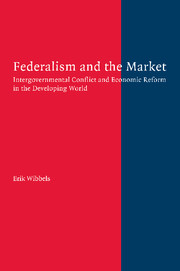Book contents
- Frontmatter
- Contents
- Acknowledgments
- 1 Intergovernmental Bargaining and Economic Policy in Federations
- 2 From Market-Preserving to Market-Distorting Federalism: Divergent Incentives and Economic Reform in Developing Nations
- 3 Federalism and the Decentralized Politics of Macroeconomic Policy and Performance
- 4 Testing the Model: Macroeconomic Reform Beyond the Federal-Unitary Distinction
- 5 Partisan Harmony, Intergovernmental Coordination, and Market Transitions: The Case of Argentina
- 6 Regional Competition, Fiscal Dependence, and Incentives in the Argentine Provinces
- 7 The View from Below: The Politics of Public Sector Reform in Three Argentine Provinces
- 8 Conclusion: Federalism, Reform, and Enduring Puzzles
- References
- Index
5 - Partisan Harmony, Intergovernmental Coordination, and Market Transitions: The Case of Argentina
Published online by Cambridge University Press: 20 July 2009
- Frontmatter
- Contents
- Acknowledgments
- 1 Intergovernmental Bargaining and Economic Policy in Federations
- 2 From Market-Preserving to Market-Distorting Federalism: Divergent Incentives and Economic Reform in Developing Nations
- 3 Federalism and the Decentralized Politics of Macroeconomic Policy and Performance
- 4 Testing the Model: Macroeconomic Reform Beyond the Federal-Unitary Distinction
- 5 Partisan Harmony, Intergovernmental Coordination, and Market Transitions: The Case of Argentina
- 6 Regional Competition, Fiscal Dependence, and Incentives in the Argentine Provinces
- 7 The View from Below: The Politics of Public Sector Reform in Three Argentine Provinces
- 8 Conclusion: Federalism, Reform, and Enduring Puzzles
- References
- Index
Summary
Chapter 4 provided evidence of a complex relationship among fiscal decentralization, the revenue raising capacity of subnational governments, intergovernmental party system structure, the size of the coalition of antireform provinces and the distinctly federal politics of macroeconomic policy making. Consistent with the model of intergovernmental bargaining presented in the theoretical chapter, the findings suggest that intergovernmental fiscal systems that are decentralized and promote subnational taxation, partisan harmony whereby the national government can rely on copartisans at the regional level, and large coalitions of pro-reform regions in the national policy-making process help solve the intergovernmental coordination problems that can plague macroeconomic policy in federations. Perhaps most important, these findings call into question the long-held assumption that policies aimed at decentralizing economic decision making to lower-level governments will generate widespread efficiency gains. Clearly, policy analysts and the traditional fiscal federalism literature have underappreciated the narrow conditions under which decentralization may provide virtuous outcomes and failed to appreciate the considerable margin for intergovernmental coordination problems vis-à-vis economic policy. Given data constraints, however, the broad cross-national statistical analyses that have characterized previous chapters provide a limited basis for comprehensively testing my model of intergovernmental bargaining and further exploring the conditions under which national and regional officials are able to coordinate policies. In carefully distinguishing between the ways in which intergovernmental partisan harmony can influence the incentives of decentralized politicians, this chapter focuses specifically on the ways in which party systems shape the likelihood of policy coordination across levels of government.
- Type
- Chapter
- Information
- Federalism and the MarketIntergovernmental Conflict and Economic Reform in the Developing World, pp. 123 - 161Publisher: Cambridge University PressPrint publication year: 2005

